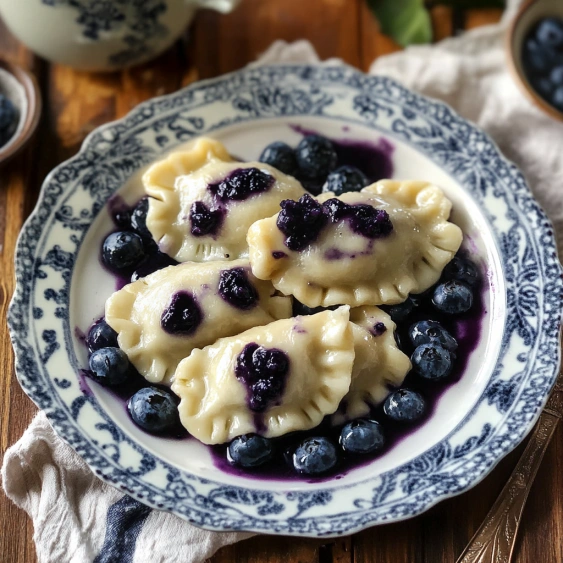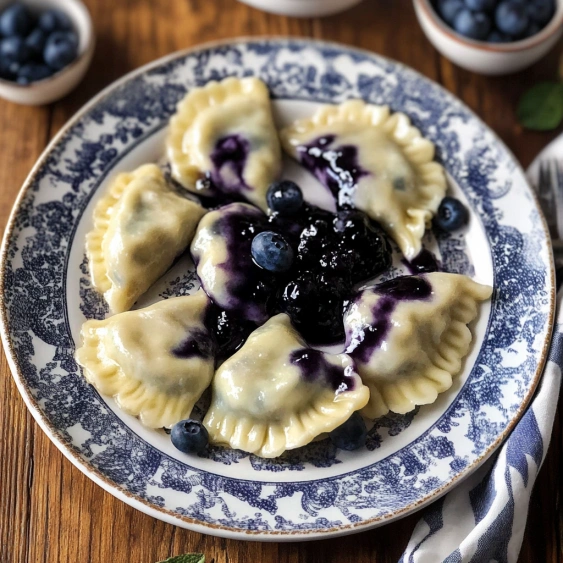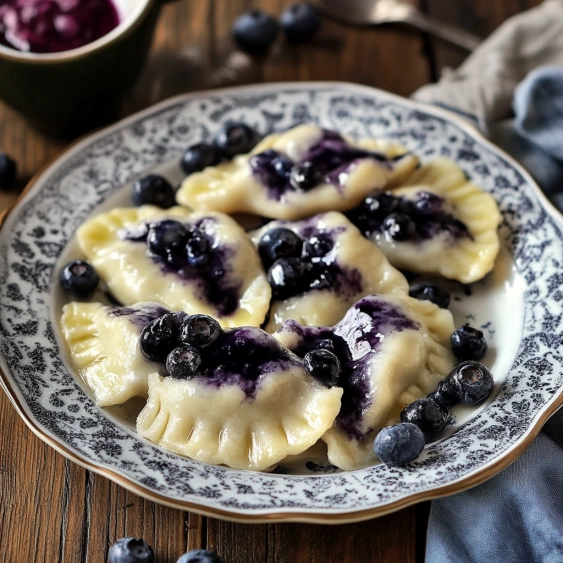 Pin it
Pin it
This blueberry pierogi recipe transforms traditional Polish dumplings into a delightful summer treat filled with sweet wild blueberries. The contrast between the tender dough and juicy berry filling creates an irresistible dessert that works equally well as a special breakfast or impressive dinner finale.
I first made these blueberry pierogi during summer berry season when my farmers market haul was overflowing. My kitchen counter turned purple from stained fingers, but the delighted expressions when I served them made every stain worthwhile.
Ingredients
- Flour: Forms the foundation of our tender dough perfect for encasing juicy berries
- Very warm water: Activates the gluten and creates the right consistency for proper pierogi formation
- Vegetable oil or butter: Adds richness to the dough without making it too heavy
- Sea salt: Balances the sweetness of the berries and enhances overall flavor
- Wild blueberries or bilberries: Provide intense flavor in a smaller package than cultivated varieties
- Cornstarch: Thickens the berry juices preventing leakage during cooking for perfect pierogi
Step-by-Step Instructions
- Combine Dough Ingredients:
- In a large bowl add flour and salt then create a well in the center. Pour in oil and gradually stream in very warm water while continuously stirring with a wooden spoon. The gradual addition prevents lumps and ensures even hydration of the flour for a smooth elastic dough.
- Knead Dough:
- Transfer the shaggy dough to a lightly floured surface and knead vigorously for a full 6 minutes. This develops gluten properly creating a silky smooth texture that will be easy to roll and shape. The dough should feel soft and pliable without sticking to your hands. Cover with an inverted bowl to prevent drying and allow to rest for 20 minutes so the gluten relaxes.
- Prepare Filling:
- Gently toss blueberries with cornstarch until every berry has a light coating. The cornstarch will thicken the juices when cooked preventing bursting pierogi. Keep fresh berries refrigerated or frozen berries in the freezer until the moment you fill each dumpling for easiest handling.
- Roll Dough:
- Break off a small portion of dough about the size of a tennis ball keeping the remainder covered to prevent drying. On a lightly floured surface roll to 2 to 3 millimeters thickness creating a nearly translucent sheet. Too thick and the pierogi will be doughy too thin and they may tear during filling.
- Cut and Fill:
- Using a 3-inch cookie cutter or glass rim stamp out rounds from the dough. Place a generous teaspoon of blueberry filling in the center ensuring berries stay away from the edges. Return unused berries to cold storage between batches to maintain their firmness.
- Form Pierogi:
- Fold the dough circle in half around the filling creating a half-moon shape. Press edges firmly together with fingertips sealing completely. Pick up each dumpling and repeat the edge sealing process ensuring no gaps remain. Place finished pierogi on a lightly floured surface and cover with a clean kitchen towel.
- Cook Pierogi:
- Drop pierogi individually into gently boiling salted water giving a gentle stir to prevent sticking. Once they float to the surface continue cooking for exactly 5 minutes. The dough will become tender and translucent while the filling transforms into a jammy consistency.
- Serve Immediately:
- Remove cooked pierogi with a slotted spoon allowing excess water to drain. Drizzle with melted butter and serve with your choice of toppings. The contrast between warm dumpling and sweet juicy filling creates a truly memorable treat.
 Pin it
Pin it
My grandmother taught me to make savory pierogi first but these blueberry ones quickly became my signature version. She always said the secret was handling the dough with confidence not fear. Even my first awkward attempts tasted wonderful proving that homemade dumplings forgive many mistakes.
Storage and Freezing
Freshly made uncooked pierogi can be frozen on a floured baking sheet until solid then transferred to freezer bags for up to 3 months. Cook directly from frozen adding 2 minutes to the cooking time. Cooked leftover pierogi will keep refrigerated for 2 days but the texture is best when freshly made as the blueberry filling can start to make the dough soggy over time.
Serving Suggestions
While traditionally served simply with melted butter and a sprinkle of sugar these blueberry pierogi transform with different toppings. Try a dollop of tangy sour cream which cuts through the sweetness perfectly. For breakfast serve with yogurt and a drizzle of honey. For an elegant dessert presentation dust with powdered sugar and garnish with fresh mint leaves and additional fresh berries.
 Pin it
Pin it
Seasonal Variations
While wild blueberries offer the most intense flavor this pierogi recipe works beautifully with other seasonal berries. Try strawberries in late spring blackberries in late summer or a mixture of berries for colorful variety. For each substitution maintain the same total volume of fruit and cornstarch ratio to ensure proper consistency of the filling.
Frequently Asked Questions
- → Can I use regular blueberries instead of wild blueberries?
Yes, you can substitute regular blueberries for wild ones. Keep in mind that wild blueberries (bilberries) are smaller and more intense in flavor, but regular blueberries work well too. Just ensure they're small to medium-sized for easier filling and sealing of the pierogi.
- → How do I prevent the blueberry juice from leaking while forming the pierogi?
To minimize leaking, keep the blueberries cold (refrigerated or frozen), coat them thoroughly with cornstarch before filling, place the filling in the center away from edges, and ensure you seal the edges well by pressing firmly with your fingertips twice. Having paper towels handy helps clean fingers between forming dumplings.
- → Can blueberry pierogi be made ahead of time?
Yes! You can prepare blueberry pierogi ahead of time in two ways: either freeze them uncooked (arrange on a floured tray until solid, then transfer to freezer bags) or cook them completely, cool, and refrigerate for 1-2 days. Reheat cooked pierogi by gently warming in a buttered skillet.
- → Why add cold water to the pot after cooking?
Adding cold water to the pot after cooking stops the cooking process immediately and helps prevent the pierogi from sticking together. This technique creates a temperature shock that helps maintain the integrity of the dumpling's texture and makes them easier to remove from the water.
- → What's the best way to serve blueberry pierogi?
The traditional way to serve sweet blueberry pierogi is warm with melted butter and a sprinkle of sugar. Other popular toppings include sour cream, yogurt, or kefir. Some people also enjoy them with a light dusting of powdered sugar or a drizzle of honey for extra sweetness.
- → How thick should I roll the dough?
Roll the dough to approximately 2-3mm thickness. If rolled too thin, the dough may tear during filling or cooking. If too thick, the pierogi will be doughy rather than tender. A consistent thickness ensures even cooking and the right texture balance between dough and filling.
